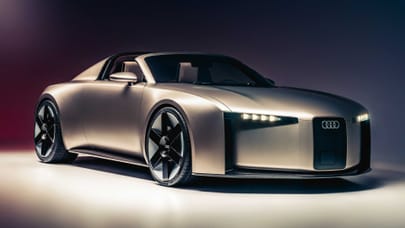
James May on... workshops
By the time you read this, I will have bought what estate agents call a second property. However, while that normally means a holiday villa in Spain or a cheap cottage in Cornwall that puts a local family on the street, I've been a lot more modern about this. I've bought a small industrial building - to whit, a workshop.
Better than that, it's joined onto my house. Until a few years ago, it was occupied by a couple of blokes who made things out of wood. It's been there since the Fifties and is a sort of monument to a time when things such as a new sash window frame was something that could be sourced locally. Next door, if you lived here.
But then they retired, and the woodshop fell silent. No longer was my working day punctuated with the elegiac lament of a table saw dividing a plank. The air around the door lost its aromatic fug of wood shavings, the router lost its tongue, and the plane wasstopped with dust. So I bought the place.
It's an amazing building just to stand in. It still smells of wood, obviously, and the sweat of men doing something useful. The sink is disgusting, but the cooker appears never to have been used. The question now is, what to do with it?
Since it has huge double doors at the front and is about the same area as five garages, it would make sense to put the cars in it. But is that right? It is a place of work, where people were creative, and turning it into a storeroom would be an insult to their memory, like turning a warehouse into trendy apartments for marketing executives.
On the other hand, I have noticed that cars, when they're not actually being used, are a bit of a nuisance. They take up a huge amount of space, and while everyone bangs on about buildings ‘blending in', the same people will wantonly buy a red car when their next-door neighbours have green ones, which makes the street look like a really pretentious hotel reception.
Part of the problem is that the busiest parts of Britain, the city centres, are generally quite old, and built before the car's time. In the house-building boom times of the interwar years and the Fifties, planners realised that families of the future would have cars, and so designed houses with at least driveways, if not proper garages. Unfortunately, those same planners failed to realise that the typical car would evolve quite quickly into something more robust and spacious than a Morris 8, so most garages are too small. That's why they're full of old furniture.
I could do my bit here to rid the streets of the abandoned car menace. But hang on a minute.
I've just made another series of my other programme, Man Lab, in which we attempt to demolish the divide between the home and the workshop. Most of the time Woman and I spend in our house is in the kitchen, cooking things. But what is the kitchen, if not a workshop?
While everyone bangs on about buildings 'blending in', the same people will wantonly buy a red car when their neighbours have green ones
Top Gear
Newsletter
Thank you for subscribing to our newsletter. Look out for your regular round-up of news, reviews and offers in your inbox.
Get all the latest news, reviews and exclusives, direct to your inbox.
The kitchen is just another place where we use tools and raw materials to make something. Why do we imagine that cooking should be divorced from sawing wood or drilling holes in steel? Apart from anything else, most cooking involves waiting for things to boil or roast or whatever, and that time can be used gainfully if, in the same room, there is a piece of furniture to be finished off. As it is, we just drink and end up burning stuff.
So I wonder if the old woodshop should be turned into something like a personal Man Lab, rather than just a dull and predictable old garage. Yes, getting cars off the street would probably benefit society, but it would also deny me an avenue of self-expression from which something useful might stem. The world was never advanced by secure parking, but lots of great things have come out of men mucking about in sheds.
I've done a few sketches. The space, and the way it's arranged, would allow me to have a small kitchen at one end and then a sizeable dining area where guests could be entertained. Even then, there would be room for some wood and metalworking machinery, a workbench, a desk, and some shelving. And even then, there would be a small reception area, equipped with ironic retro sofas where people could relax with a drink.
This place could become the hub of a new movement, where intellectuals and craftspeople mix freely and exchange their philosophies, in an atmosphere of liberality and parmesan shavings. An emeritus professor of ancient history and a boatbuilder would feel equally comfortable and of equal merit in this place.
Yes, that settles it. I'm going to fill it with cars.
Trending this week
- Car Review
BMW iX3








